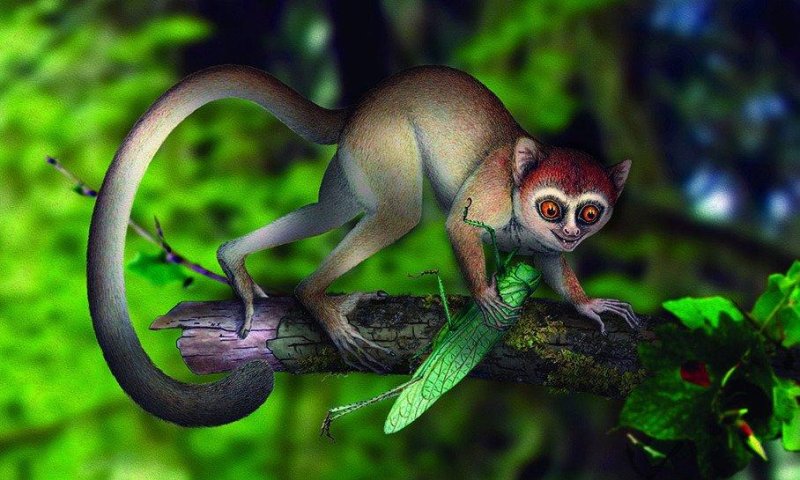1 of 2 | Archicebus achilles artist rendition. (CAS/Xijun Ni)
The world's oldest known fossil primate skeleton has been discovered, representing a previously unknown genus and species named Archicebus achilles, according to research published today in the journal Nature.
The fossil was buried in an ancient lake bed in central China's Hubei Province, near the modern Yangtze River. The international team of scientists was led by Dr. Xijun Ni of the Institute of Vertebrate Paleontology and Paleoanthropology (IVPP) at the Chinese Academy of Sciences in Beijing.
In addition to being the oldest known example of an early primate skeleton, researchers believe Archicebus represents the divergence in the lineage of modern anthropoids including monkeys, apes and humans, from the lineage leading to living tarsiers.
The Archicebus skeleton is about 7 million years older than the oldest known fossil primates, which include Darwinius from Germany and Notharctus from the Bridger Basin in Wyoming. But those two examples are early relatives of living lemurs, the most distant branch of the primate family tree with respect to humans and other anthropoids.
Archicebus belongs to a new branch of the primate evolutionary tree that lies much closer to the lineage leading to modern monkeys, apes and humans.
"Archicebus differs radically from any other primate, living or fossil, known to science," Dr. Christopher Beard, of the Carnegie Museum of Natural History in Pittsburgh, said in a statement.
"It looks like an odd hybrid with the feet of a small monkey, the arms, legs and teeth of a very primitive primate, and a primitive skull bearing surprisingly small eyes. It will force us to rewrite how the anthropoid lineage evolved," Beard said.
Until the 1990s, every suspected early anthropoid had been found in Egypt and dated to about 30 million years ago. Then researchers discovered petite primates that lived 37 million to 45 million years ago in China, Myanmar, and other Asian nations.
People have long thought of humans as coming out of Africa, but these new findings suggest early anthropoids actually came out of Asia, and colonized Africa.
The new fossil takes its name from the Greek arche (meaning beginning or first; the same root as archaeology) and the Greek kebos (meaning long-tailed monkey). The species name achilles highlights the new fossil's unusual ankle anatomy.
"People may see this simply as another discovery of a well preserved fossil, but to reveal the remarkable secrets that have been hidden in the rock for millions of years, we undertook extensive work, applied state-of-the-art technology, and intensive international cooperation took place behind the scenes at several museums. It took us ten years", added Dr. John Flynn, curator of the American Museum of Natural History.















